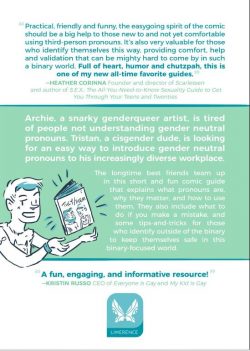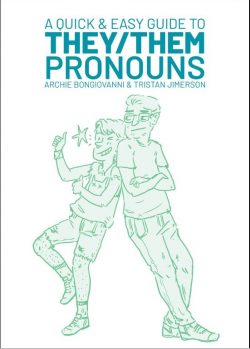

By Archie Bongiovanni & Tristan Jimerson (Limerance/Oni Press)
ISBN: 978-1-62010-499-6 (PB) eISBN: 978-1-62010-500-9
Comic strips have long been acknowledged as an incredibly powerful tool to educate, rendering tricky or complex issues easily accessible. They also have an overwhelming ability to affect and change behaviour and have been used for centuries by politicians, religions, the military and commercial concerns to modify how we live our lives.
Here’s a splendid example of the art form using its great powers for good…
Despite what the old adage might say, words are not only harmful, but also shape how people react to or regard… well, everything.
Semantic shading is prevalent in all aspects of human communication, and predisposes us to respond in certain manners; frequently in contradiction to all other data. I still have a scar on my finger from when I was nine and picked up a cute, cuddly, playfully welcoming kitten, clearly in a manner it found inappropriate and uncomfortable.
In the social contract we all live under, every person (and almost all of the animals and some complex machinery) should expect to be treated with courtesy and in terms they find comfortable and acceptable. I have used nine different pen-names in a long and undistinguished creative career and respond to them equally, as readily as my own name (no matter how badly mangled it might be by people I don’t expect to possess any facility or familiarity with the Eastern European pronunciation or syntax it stems from).
I don’t even care if people call me “madam†or late for dinner.
I’m somewhat less sanguine about rude or aggressive people using “oi, mateâ€, “baldy†or “hey youâ€. I have no patience at all for those who smugly tell me I’m saying my own name wrong…
At least I’m fortunate enough to fall into a broad category of cisgendered folk who unthinkingly share appropriately-gendered pronouns. That’s not a situation everybody enjoys, but is one that can and should be rectified. Misgendering (intentional or otherwise) is arrogant, lazy, impolite and selfish: It’s 2019 and we should all be accepted on our own terms by now.
All it takes is willingness and a little effort… and – if these concepts are new to you – this extremely engaging little paperback guide, crafted by two lifelong friends addressing the issue from the most different of positions.
Archie Bongiovanni is non-binary: identifying as a genderqueer artist who feels “Him†and “Her†are not pronouns that apply or are relevant. As part of a widely diverse and continually diversifying society, they (that was me doing the gender pronoun thing, there) feel those terms can – and should – be supplemented by other, neutral words: in this specific case “They†or “Themâ€.
Tristan Jimerson is a cisgendered man who works as a copywriter and runs a restaurant. As part of an inherited social majority he had no choice in originally defining, he is keen to adjust the way he refers to people so as be inclusive, polite and non-discriminatory.
The book they created together is inexpensive, informative, great fun and available in physical and digital editions (so you should get loads of copies and start giving them to everybody you know).
It also means the only terms you’re getting for free here are the aforementioned Non-Binary – meaning someone who does not identify as either male or female – and Cisgender – which translates as a person who agrees and accepts the gender they were assigned at birth. If you need clarification on terms like “gender†or “pronoun†that’s what books and search engines are for; and check back to what I just said about being lazy…
As well as simple, affable explanations, tips and hints, you’ll find here cartoon reference charts and lists clarifying what to say, to whom and when, with examples and suggestions for why you should rethink your viewpoint if you’re feeling reluctant, or recalcitrant. Readers will be gently introduced to concepts such as ‘YOLO’, ‘Why Pronouns Matter’ and ‘How to use They/Them pronouns in Everyday life: A Practical Guide!’ as well as profiting from sections ‘For Folks Identifying with Alternative Pronouns’ and much more…
A handy guide to simple courtesy and common human decency, this is a marvellous attempt to help us all get along a little more easily. Maybe we should find an equivalent publication dealing with climate change, commercial expediency and political short-termism…?
A Quick & Easy Guide to They/Them Pronouns ™ & © 2018 Archie Bongiovanni & Tristan Jimerson. All rights reserved.
